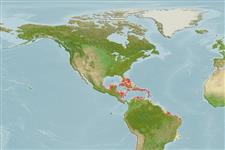Common names from other countries
Environment: milieu / climate zone / depth range / distribution range
Ekologi
marina revassocierade; djupintervall 0 - 5 m (Ref. 9710). Subtropical
Western Atlantic: southern Florida (USA), Bahamas, and Yucatan, Mexico to northern South America.
Size / Vikt / Age
Maturity: Lm ? range ? - ? cm
Max length : 6.0 cm TL hane/ej könsbestämd; (Ref. 7251)
Taggstrålar i ryggfenan (totalt) : 20 - 21; Mjukstrålar i ryggfenan (totalt) : 11; Taggstrålar i analfenan: 2; Mjukstrålar i analfenan: 19 - 20. Body with dark bars; first two bars connected to form an H, last two bars remote from first (Ref. 26938).
Inhabits limestone rock, rubble and coral reef areas. Usually near sea urchins (Ref. 9710). Feeds on amphipods and copepods (Ref. 13628).
Life cycle and mating behavior
Maturities | Reproduktion | Spawnings | Egg(s) | Fecundities | Larver
Robins, C.R. and G.C. Ray, 1986. A field guide to Atlantic coast fishes of North America. Houghton Mifflin Company, Boston, U.S.A. 354 p. (Ref. 7251)
IUCN Red List Status (Ref. 130435)
CITES (Ref. 128078)
Not Evaluated
Threat to humans
Harmless
Human uses
Verktyg
Special reports
Download XML
Internet-källor
Estimates based on models
Preferred temperature (Ref.
115969): 26.4 - 28.2, mean 27.5 (based on 541 cells).
Phylogenetic diversity index (Ref.
82804): PD
50 = 0.5000 [Uniqueness, from 0.5 = low to 2.0 = high].
Bayesian length-weight: a=0.00912 (0.00399 - 0.02083), b=3.06 (2.87 - 3.25), in cm Total Length, based on LWR estimates for this (Sub)family-body shape (Ref.
93245).
Trofisk nivå (Ref.
69278): 3.2 ±0.36 se; based on food items.
Fishing Vulnerability (Ref.
59153): Low vulnerability (10 of 100).
